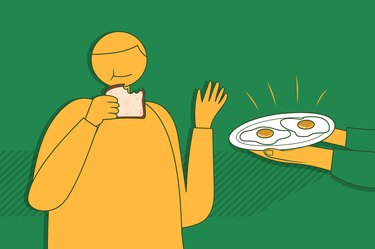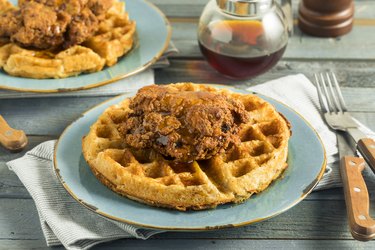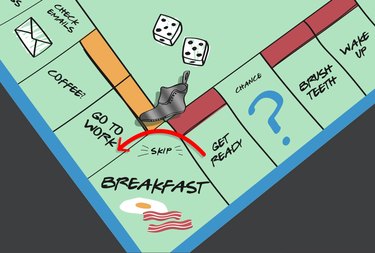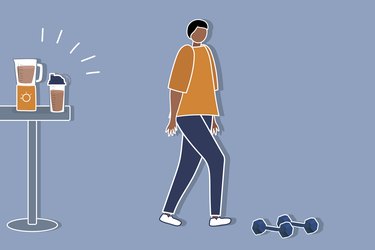
Protein's touted as the key to weight loss and the main macro for muscle gains. But how important is protein really? And does it matter exactly when we eat it? Below, registered dietitians answer why protein matters, particularly at breakfast.
Why Is Protein Important in the First Place?
Protein is one of the three macronutrients in the diet, along with carbohydrates and fats. While each macro serves key functions, protein is often pegged as the macro for weight management and muscle mass synthesis.
Video of the Day
After all, research suggests that adults lose 3 to 5 percent of their lean body mass every decade after age 30, per Harvard Health Publishing, and eating enough dietary protein can help mitigate this process. But protein supports so much more than just muscle.
Protein is also essential for the health of our bones, organs, tissues, skin and hair, says Sarah Becker, RD, a registered dietitian at Indigo Wellness Group. "Not only is protein important for the physical structure of our bodies but it also plays a critical role in satiety, stress, mood, detoxification, immunity, enzyme production, pH and fluid balance and hormone health."
Neurotransmitters in the brain are also made from amino acids, the building blocks of proteins. "This is why eating enough protein is essential for overall wellbeing, including mental health," says Anya Rosen, RD, IFNCP, registered dietitian, functional medicine practitioner and founder of the Birchwell Clinic.
The Health Risks of Skipping Protein at Breakfast
Clearly, protein's important. But what's with all the hype around incorporating protein at breakfast specifically? A registered dietitian explains some of the potential health risks of skipping protein at your morning meal.
1. Skipping Protein Can Lead to a Crash in Blood Sugar (and Energy) Levels
When we eat carbohydrates alone, the breakdown product, glucose, gets absorbed into the bloodstream quickly. The result is a rapid rise and subsequent fall in blood sugar levels. That fall, or crash, is commonly associated with feelings of fatigue, weakness or a lack of focus.
"Including protein at breakfast can help stabilize blood sugar and therefore improve energy levels because it blunts the blood sugar spike associated with carbohydrates in the meal," Rosen explains.
Even people already diagnosed with high blood sugar can benefit from eating more protein first thing in the morning. That is, emphasizing protein at breakfast even more so than at dinner was associated with slower disease progression and a reduced risk of heart disease among people with diabetes, per a July 2020 observational study in Diabetes Care.
To power through the morning, avoid "naked" carbs by adding lean protein foods — such as skinless poultry, fish, eggs, beans, tofu and protein powder — to your plate as well.
2. Skipping Protein May Cause You to Feel Hungry
Have you ever eaten a bowl of cereal or a plain bagel for breakfast and then felt hungry an hour later? That's probably because the meal was missing protein.
While protein and carbohydrates are identical on a calorie-for-calorie basis (both deliver 4 calories per gram), it takes the body longer to break down proteins than carbs.
Indeed, a small February 2006 study in the American Journal of Clinical Nutrition found that a high-protein breakfast significantly slowed down the rate at which the stomach emptied when compared to a high-carb breakfast, explaining in part why protein-rich meals typically keep us feeling full for longer.
3. Skipping Protein May Promote Weight Gain
In addition to helping stabilize blood sugar levels, protein influences the hormones that help control our appetite and promote satiety, or a sense of satisfaction and fullness from meals. When we eat protein, "the hunger hormone ghrelin is [decreased] while appetite-reducing hormones, like GLP-1, peptide YY and CCK, increase," Becker says.
Research conducted in adolescents and children has also shown that breakfasts higher in protein may increase energy expenditure (aka calorie burn) and decrease the frequency of nighttime snacking when compared to lower-protein and skipped breakfasts, per the American Society for Nutrition.
And because protein fills us up more than carbs do, we often need to eat more food when we're eating carbohydrates only at breakfast. Over time, those high-carb breakfast staples — like bagels or muffins — may translate to weight gain and blood sugar dysregulation.
The bottom line: Putting protein on your breakfast plate can translate to "less cravings, less grazing and [fewer] cases of the hangries," Becker says, all of which can ultimately lead to weight loss.
Tip
Eating protein in the morning may benefit your heart. A June 2021 study in Clinical Nutrition saw that greater protein intake at breakfast was associated with lower blood pressure and higher HDL cholesterol (that’s the healthy type of cholesterol) levels. To keep your heart happy, emphasize lean (low-fat) proteins like those highlighted below.
How Much Protein Should I Be Eating at Breakfast?
The optimal amount of dietary protein for each person depends on a number of factors, including age, body size, stage of life, physical activity levels and existing medical conditions.
"The best way to determine how much protein you need at breakfast is to estimate your daily needs and divide it equally among your meals and snacks for the day," Rosen says.
A quick and dirty way to do this is to divide your weight by 2 and aim to eat that many grams of protein daily. For example, a 150-pound person might need roughly 75 grams of protein per day, or about 25 grams of protein at each of their three main meals. Of course, this calculation is highly subject to change based on your health status, goals and activity levels. For example, if you're trying to build muscle, you'll need more protein than the number you'd get from this equation.
If you're looking for a personalized protein goal, work with a registered dietitian.
Tip
For reference, “two eggs have about 12 grams of protein and a serving of collagen or protein powder is typically [around] 20 grams of protein,” Becker says. Making a smoothie that includes a scoop of protein powder and a tablespoon of hemp seeds can easily put 25 grams of protein in your cup.
Can You Overdo It on Protein at Breakfast?
We can overdo it on any food (yes, even broccoli) if eaten in excess. The same risks apply whether you're overeating protein at breakfast or in general.
"For an individual without kidney dysfunction, the risks of consuming an excessive amount of protein are comparable to consuming an excess of any other food: mainly weight gain or gastrointestinal discomfort," Rosen says. "People with preexisting kidney disease should monitor their protein intake under the guidance of a registered dietitian who specializes in renal disease due to the increased stress involved with filtering and excreting nitrogen and other waste products."
And while it's crucial to incorporate protein in our morning meals, it shouldn't be added in at the expense of other macros. "Protein is only one piece of the nutrition puzzle," Becker reminds us. "If your breakfast is solely protein you'll miss out on [an opportunity to eat] energy-yielding carbohydrates, gut-friendly fiber and healthy fats [that support hormone balance], not to mention the vitamins and minerals that these foods provide."
Best to pair lean proteins with quality carbs and heart-healthy fats for a balanced breakfast.
How to Incorporate Protein at Breakfast
Try these dietitian-approved ways to eat protein in the a.m.:
- Make a veggie-packed egg scramble (with the yolks!) with veggies and a slice of whole-wheat toast on the side
- Cook up some fried eggs and enjoy them over a bed of greens with lentils, avocado and sauerkraut
- Make a balanced parfait or smoothie with protein-rich Greek yogurt, berries and low-sugar granola
- Combine cottage cheese with berries and chia seeds for a trio full of protein and fiber
- Add a high-quality protein powder into oatmeal or homemade smoothies
- Top avocado toast with smoked salmon and arugula
- Make a nutrient-dense tofu scramble with onions, bell peppers and your favorite herbs or spices
- Heat up dinner leftovers for breakfast
- Whip up high-protein pancakes using bananas, eggs, protein powder and oats
- Make a high-protein grain bowl with quinoa, black beans, chicken sausage and your favorite cooked veggies
- Swap classic butter for peanut or almond butter on whole-wheat toast along with fresh fruit and hemp seeds
So, Is It Really That Bad to Skip Protein at Breakfast?
It's pretty bad. "Protein at breakfast is a key opportunity to set the stage for optimal metabolism throughout the day," Rosen says. "When you skip protein at breakfast, your body and brain lose out on an essential, healing nutrient."
While a slice of toast on the way out the door certainly isn't a great health offense, regularly including protein in your morning meals is helpful for managing weight, promoting satiety, stabilizing blood sugar levels and hitting specific fitness goals.
- Harvard Medical School: “Preserving Your Muscle Mass”
- Clinical Nutrition: “Greater Protein Intake at Breakfast or as Snacks and Less at Dinner is Associated with Cardiometabolic Health in Adults”
- American Society for Nutrition: “Protein, Its What’s for Breakfast”
- Diabetes Care: “The Association of Energy and Macronutrient Intake at Dinner Versus Breakfast With Disease-Specific and All-Cause Mortality Among People With Diabetes: The U.S. National Health and Nutrition Examination Survey, 2003-2014”
- American Journal of Clinical Nutrition: "Effect of a High-Protein Breakfast on the Postprandial Ghrelin Response"
Was this article helpful?
150 Characters Max
0/150
Thank you for sharing!
Thank you for your feedback!






